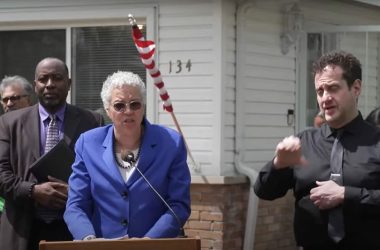Washington, D.C.-(ENEWSPF)- In the wake of today’s ruling finding section 3 of the Defense of Marriage Act unconstitutional, the Human Rights Campaign is urging the administration to broadly implement the decision, provide guidance to federal agencies and married couples about access to federal rights and benefits, and take whatever further action is necessary to ensure that the largest number of lesbian and gay married couples are able to access the widest array of benefits and protections under federal law.
Same-sex couples who are legally married and live in a marriage equality state should be eligible for the same rights, benefits, and protections afforded to straight married couples, virtually right away. But because the more than 1,100 federal rights and responsibilities of marriage are administered by many different federal agencies – many with different rules about which state’s laws they look to in determining if a marriage is valid – it is possible that legally married lesbian and gay couples living in a state that does not recognize their marriage may not have access to certain benefits, at least for the time being.
"Federal recognition for lesbian and gay couples is a massive turning point for equality, but it is not enough until every family is guaranteed complete access to the protections they need regardless of state borders,” said Human Rights Campaign President Chad Griffin. “The Administration must take every possible step to ensure this landmark ruling treats every lawfully-married couple across the country with the equality our Constitution guarantees.”
The Human Rights Campaign has conducted an exhaustive review of federal laws and regulations that pertain to marriage and has presented a set of recommendations to the administration to ensure that some families don’t fall through the cracks even with Section 3 of DOMA off the books. Under some of these rules, a federal agency looks at whether the state where a marriage was performed to determine if it is valid – meaning married same-sex couples should be recognized wherever they live. But some agencies’ rules look to whether a couple’s state of residence recognizes their marriage, which could impede recognition of many couples living in states without marriage equality.
HRC and a coalition of LGBT legal and policy groups have also prepared guidance for married same-sex couples about what the Court’s decision may mean for a host of federal rights and benefits, which will be available online today at www.hrc.org/SCOTUS. HRC will work to make sure that all legally married gay couples have access to all the rights and benefits of marriage.
While section 3 of DOMA is gone, parts of the law remain on the books and Congress must act to pass the Respect for Marriage Act to ensure all legal marriages are respected throughout the country. HRC will also be engaging in a public education campaign to highlight the stories of couples who are not fully able to access federal rights and benefits.
The Human Rights Campaign is America’s largest civil rights organization working to achieve lesbian, gay, bisexual and transgender equality. By inspiring and engaging all Americans, HRC strives to end discrimination against LGBT citizens and realize a nation that achieves fundamental fairness and equality for all.








